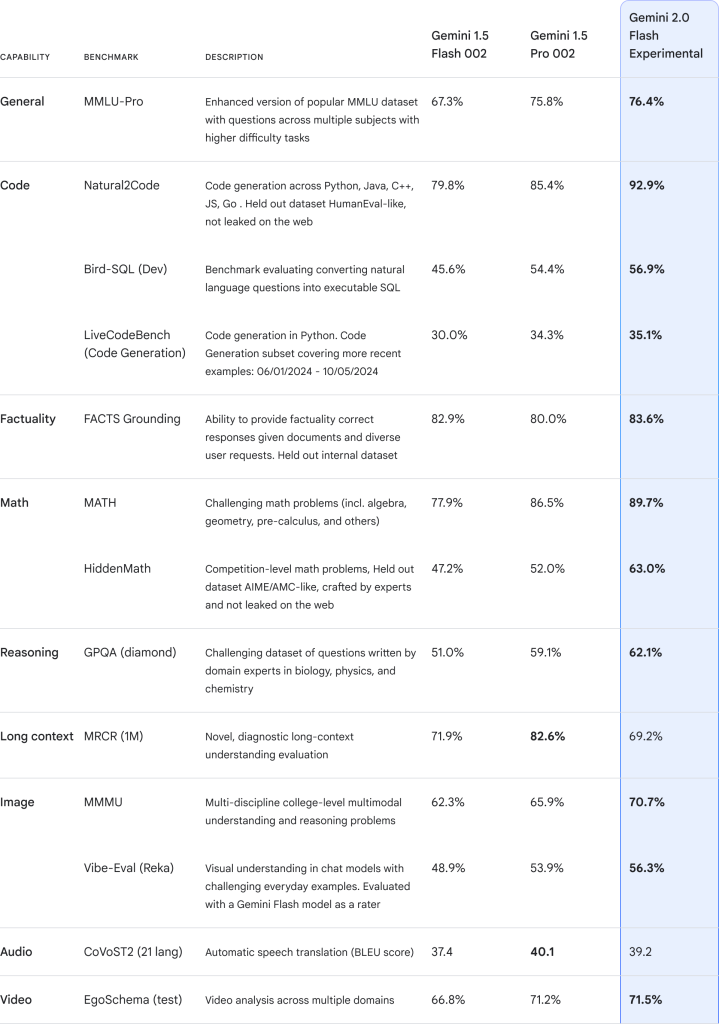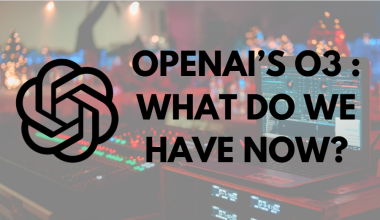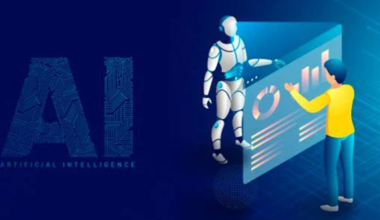Introduction
Google’s Gemini 2.0 represents a significant advancement in AI technology, building upon the foundation laid by its predecessor. The announcement was made by Demis Hassabis, CEO of Google DeepMind, and Koray Kavukcuoglu, CTO of Google DeepMind, on behalf of the Gemini team.
Gemini 2.0 Flash is now available as an experimental preview release through the Gemini Developer API and Google AI Studio. The model introduces new features and enhanced core capabilities, discussed ahead.
What is Gemini 2.0?
Gemini 2.0 is the newest launch by Google which captures the highest quality of Large Language Models with advanced capabilities, compared to its first release, Gemini 1.0. The newer Gemini is packed with multiple input types, better response times, and its newest focus, Agentic AI.
Agentic AI refers to an advanced AI system that autonomously takes actions, adapts in real-time, and, solves multi-step problems based on context and objectives. Enterprises today navigate a complex landscape marked by escalating costs, fierce competition, and rapid technological evolution.
The goal is to make these models accessible safely and quickly. Over the past month, early experimental versions of Gemini 2.0 were shared, receiving valuable feedback from developers. Gemini 2.0 Flash is now available as an experimental model to developers via the Gemini API in Google AI Studio and Vertex AI.
Gemini 2.0 : The Development process
Here’s a deeper look into its development:
- Focus on Multimodality: Gemini 2.0 is designed with a strong emphasis on multimodality, meaning it can understand and generate various types of information, including text, images, audio, video, and code. This allows for more natural and comprehensive interactions.
- Enhanced Reasoning and Coding Abilities: Google has focused on improving Gemini’s reasoning and coding capabilities. This means it can handle more complex tasks, such as problem-solving, logical inference, and generating sophisticated code.
- Agentic Capabilities: A key theme in Gemini 2.0’s development is “agentic AI.” This refers to AI that can proactively take actions and complete tasks on behalf of the user, moving beyond simply responding to prompts. This is reflected in projects like Project Astra, Project Mariner, and Jules, which explore how Gemini can be used to create more interactive and helpful experiences.
- Efficiency and Scalability: Google has worked on improving the efficiency and scalability of Gemini 2.0, making it faster and more cost-effective to run, enabling it to handle a larger number of users.
Gemini 2.0 : The Release
Here’s a look at the Release structure of Gemini 2.0:
- Phased Rollout: Gemini 2.0 is being released in phases. Initially, it was made available to developers and testers through the Gemini API in Google AI Studio and Vertex AI. This allows developers to experiment with the new model and integrate it into their applications.
- Experimental Model for Users: An experimental version of Gemini 2.0, called Gemini 2.0 Flash, has been made available to all Gemini users. This allows the general public to experience some of the new capabilities of Gemini 2.0 and provide feedback.
- Integration with Google Products: Gemini 2.0 is expected to be integrated into various Google products and services, enhancing their AI capabilities. This could include Search, Assistant, Workspace, and more.
- Emphasis on Responsible AI: Google has emphasized its commitment to building AI responsibly, with safety and security as key priorities in the development and release of Gemini 2.0.
Gemini 2.0 : How is it better?
Google boasts about Gemini 2.0 being the most revolutionary AI model they have ever released, but what are the features that make it the best? Let’s find out.
Key Improvements:
- Native Image and Audio Output: Gemini 2.0 can natively generate images and audio, expanding its creative potential.
- Tool Use: Gemini 2.0 can use tools and APIs to access external information and perform actions, making it more versatile and capable.
- Improved Performance: Gemini 2.0 is expected to show improvements in various benchmarks compared to previous versions, demonstrating its enhanced capabilities.
Gemini 2.0 : Benchmark Analysis
When being compared to it’s predecessor versions, Gemini 2.0 Flash performs exceptionally. The below table released officially by Google showcases how the model has improved overtime.

Gemini 2.0 : The projects
Gemini 2.0 is more than just a chatbot. It packs within itself a multitude of opportunities and projects that Google is focusing on for the future.
These projects are aimed at bringing the Agentic AI revolution to the forefront of development and research, allowing individuals to have access to the latest resources.
Google DeepMind talks about 3 of it’s current Projects, which are:
- Project Astra; a research prototype exploring future capabilities of universal AI agents
- Project Mariner; exploring human-agent interactions, starting from the browser
- Jules; AI-powered code-agent, for developers.
These projects are all powered by Gemini 2.0, and are under development stages.
Let’s take a look at each of these.
Project Astra: The Universal AI Assistant
- Concept: Imagine an AI assistant that’s not just reactive, but truly proactive and helpful in your daily life. That’s the vision behind Project Astra.
- Key Features:
- Multimodal Understanding: Astra can process information from various sources, including your phone’s camera and microphone, to understand your surroundings and context.
- “Memory” of the Real World: It can “remember” what it sees and hears, allowing for more natural and continuous interactions. For example, if you show it a plant, it could remember that plant later and provide information about it.
- Integration with Google Services: Astra can leverage Google Search, Lens, and Maps to provide relevant information and assistance.
- Multilingual Capabilities: It can converse in multiple languages and understand mixed language input, making it more accessible to diverse users.
- Multimodal Understanding: Astra can process information from various sources, including your phone’s camera and microphone, to understand your surroundings and context.
- Potential Applications: Astra could revolutionize how we interact with technology, offering assistance with tasks like:
- Navigating unfamiliar places
- Learning about new things in your environment
- Managing daily tasks and reminders
- Providing real-time information and support
- Navigating unfamiliar places
Project Mariner: AI Agents in Your Browser
- Concept: Project Mariner explores how AI agents can enhance the web browsing experience.
- Key Focus: Creating seamless and intuitive interactions between users and AI agents within the browser environment.
- Potential Applications: Mariner could lead to features like:
- AI-powered summarization of web pages
- Intelligent assistance with online forms and tasks
- Personalized recommendations and content filtering
- More natural and conversational web searches
- AI-powered summarization of web pages
Jules: The AI Coding Companion
- Concept: Jules is designed to be an AI-powered coding assistant that helps developers write, debug, and understand code more efficiently.
- Key Features:
a. Code Generation and Completion: Jules can generate code snippets, suggest code completions, and even help write entire functions or programs.
b. Bug Detection and Fixing: It can analyze code to identify potential errors and suggest fixes.
c. Code Explanation and Documentation: Jules can help developers understand complex code by providing explanations and generating documentation. - Target Users: Primarily aimed at software developers, but could also be helpful for anyone learning to code.
Gemini2.0 is now available on Chatclient, try it out by signing up here.
Gemini 2.0 : The Security
Google has placed a strong emphasis on responsible AI development with Gemini 2.0, and security is a crucial part of that. Here’s a look at some of the security measures incorporated:
1. Safety Filters and Content Moderation:
- Adjustable Safety Filters: Gemini 2.0 includes adjustable safety filters that allow developers to control the level of content moderation. These filters can block content based on the probability of it being unsafe, with categories like “high,” “medium,” “low,” or “negligible” probability of harm.
- Built-in Protections: There are also built-in protections against core harms, such as content that endangers child safety. These types of harm are always blocked and cannot be adjusted.
2. Resistance to Prompt Injections:
- Prompt injection is a technique where malicious actors try to manipulate an AI model’s behavior by crafting specific prompts. Google has designed Gemini 2.0 to be more resistant to these attacks, making it harder for attackers to hijack the model or make it generate harmful content.
3. Data Privacy and Security:
- Data Minimization: Google likely employs data minimization techniques, collecting only the necessary data to operate and improve Gemini 2.0.
- Data Encryption: Data is likely encrypted both in transit and at rest to protect it from unauthorized access.
- Access Controls: Strict access controls are likely in place to limit who can access and modify the model and its underlying data.
4. Transparency and Accountability:
- SynthID: Google is using tools like SynthID to apply invisible watermarks to AI-generated content. This helps ensure accountability and reduces the risk of misattribution.
- Responsible AI Principles: Google has a set of Responsible AI Principles that guide the development and deployment of its AI technologies, including Gemini 2.0. These principles emphasize fairness, privacy, security, and accountability.
5. Ongoing Monitoring and Improvement:
Iterative Development: Security is an ongoing process. Google is committed to iteratively improving the security of Gemini 2.0 based on feedback and new research.
Continuous Monitoring: Google continuously monitors Gemini 2.0 for potential security vulnerabilities and harmful outputs.
By combining these technical safeguards with a strong commitment to responsible AI principles, Google aims to make Gemini 2.0 a secure and trustworthy platform for building the next generation of AI applications.
Conclusion
Overall, Gemini 2.0 represents a significant step forward in AI development, with a focus on multimodality, reasoning, agentic capabilities, and responsible AI practices. The phased release allows Google to gather feedback and refine the model before wider integration into its products and services. More information about the model can be accessed through this link.
Want to know how Gemini and ChatGPT compare? Look here.
How does one work with Claude and it’s newest release? Check here.


